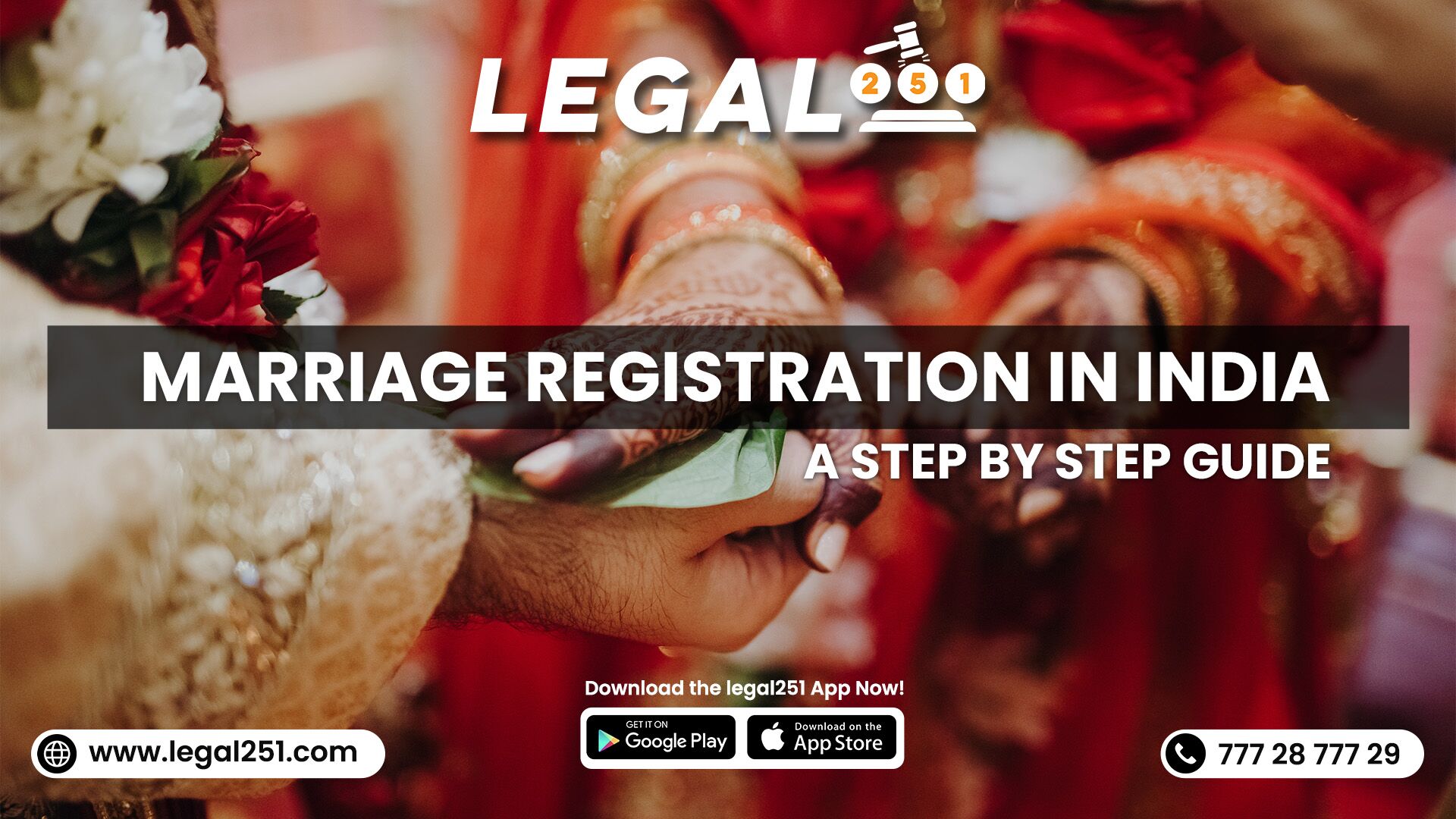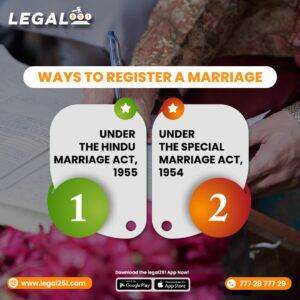

Marriage registration in India is a crucial legal procedure that grants couples official recognition of their union through a marriage certificate. A designated marriage officer or marriage registrar issues the marriage certificate. Whether it is an intended marriage or a traditional Hindu marriage, the process involves several essential steps and documentation.
To begin the marriage registration process, couples need to fill out an application form, providing personal details and relevant information. Documents like birth certificates, residential proofs, marriage invitation cards, and passport-size photographs of both partners are essential for registration. Both parties need to provide a valid consent statement. In certain cases, authorities may publish a public notice to enable objections. They usually observe a 30-day period for inquiries and verification. This helps ensure that the marriage is not within the prohibited degree of relationship. The authorities grant the marriage registration certificate upon successfully completing the inquiry period.
Couples seeking registration through the online mode can complete the entire procedure on dedicated portals, uploading crucial documents for verification. Online registration usually incurs a marriage procedure fee.
Many couples now opt for a convenient, mouse-click experience to complete the necessary paperwork without the need for physical presence.
In special marriages, where partners belong to different religions or cultural backgrounds, the couple may follow an offline registration process. This process often includes a wedding ceremony, solemnized according to religious rituals and customs. The marriage officer plays a significant role in ensuring the accurate recording of all relevant details throughout the registration process. The marriage registration process typically involves a period for objection certificates, in case any party raises concerns about the validity of the marriage. Proper identification documents, such as driving licenses or conversion certificates (if any), serve as legal proof during the process.
The marriage registration process in India leaves no stone unturned in ensuring that couples can officially declare their union through legal means. Regardless of whether it’s an online or offline mode, the comprehensive process and submission of all relevant documents play a vital role in securing a marriage certificate. The entire procedure aims to provide couples with a seamless and legally recognized marital bond.
Marriage is a secret tie between two individuals, willing to be together as husband and wife forever. In India, people believe that wedlock is a sacred institution. India has quite a few marriage registration laws.
In recent days registration of a marriage is important in various aspects. The registration of a marriage not only gives legal validation to the wedlock, but it also gives a sense of security to the bride and groom if things turn out of plumb. Registration provides legal protection to both partners in case of disputes or separation. It establishes a formal record of the marriage, making it easier to resolve legal issues related to property, custody, alimony, and other matters in the event of a divorce or separation. Obtaining visas and fulfilling immigration purposes often require marriage registration. It facilitates the visa application process for both the spouse within India and for international travel.

The Hindu Marriage Act mandates the registration of marriage in cases where both the husband and wife are Hindus, Buddhists, Jains, or Sikhs, or if they have converted into any of these religions.
The Special Marriage Act serves as a comprehensive legal framework for both the solemnization and registration of marriages, specifically designed to accommodate couples where either one or both partners do not belong to the Hindu, Buddhist, Jain, or Sikh religious communities.
The Hindu Marriage Act specifies certain conditions that one must fulfill before registering a marriage to validate it. The aforesaid conditions have been specified under Section 5 and Section 7 of the Act.
By virtue of section 5 of the Hindu Marriage Act 1955, a marriage will be valid only if both the parties to the marriage are Hindus. If one of the individuals involved in the marriage follows the Christian or Muslim faith, it is important to note that the union would not be considered a valid Hindu marriage according to existing legal provisions.
A marriage may be solemnized between any two Hindus if the following conditions are fulfilled, namely:
The act states that religious ceremonies are not obligatory for a marriage to be considered complete. Instead, the Act establishes specific conditions under Section 4 that must be met for a marriage to be legally recognized:
In the case of Muslims marrying another Muslim, they have the option to choose between their personal uncodified laws or the Special Marriage Act. This means they can decide whether to follow the customs and regulations dictated by their religion or adhere to the guidelines set forth in the Special Marriage Act.

The registration of marriage is now also available at your fingertips as the same can be done online as well. One can register his or her marriage under any of the aforesaid acts, by opting for either offline mode or online mode.
In India, just like various other essential services available online, marriage registration can now be done through online platforms. Opting for online registration is highly preferred as it offers time-saving convenience, eliminating the need to stand in long queues, particularly in this era of social distancing. Here is a simplified breakdown of the steps involved in the online registration process:
Please note that the timeframe for scheduling the actual marriage ceremony, as given by the marriage registrar, may differ based on the applicable marriage law. According to the provisions of the Hindu Marriage Act, 1955, the date and time for marriage are generally scheduled within approximately 15-30 days after the submission of the application form. However, for marriages falling under the Special Marriage Act, 1954, the waiting period is typically around 60 days.
To register a Hindu marriage, it is necessary to visit the office of the sub-registrar under whose jurisdiction the marriage was solemnized. Alternatively, registration can take place at the sub-registrar’s office where either of the partners has been residing for a period exceeding six months.
Under the Special Marriage Act, 1954, couples planning to register their marriage must adhere to a specific procedure. Firstly, they are required to provide a 30-day notice to the sub-registrar who has jurisdiction over the residence of either partner. This notice is displayed on a public notice board for a duration of 30 days. If no objections are raised during this period, the marriage is officially registered.
This unique process allows the marriage to be legally recognized without the need for any religious ceremonies or rituals. The Special Marriage Act, 1954 provides an inclusive alternative for individuals who may not meet the eligibility criteria for registering their marriage under the Hindu Marriage Act in India. It provides a legal framework specifically designed for those who wish to solemnize their marriage outside the confines of specific religious customs or for couples who come from different faith backgrounds and opt for an interfaith marriage.
The documents required for marriage registration in India may slightly vary from state to state. However, here is a simplified list of the common documents needed:
These documents are essential to complete the marriage registration process and ensure the lawful recognition of the union.
In conclusion, the process of marriage registration in India involves several key steps and requirements. Obtaining a marriage certificate is crucial, and it requires the involvement of the Marriage Officer or Marriage Registrar. Before proceeding with the registration, it is important to ensure that the intended marriage complies with legal guidelines and customs, and both parties must provide valid consent.
The registration process involves filling out application forms, providing residential proof, and submitting necessary documents such as birth certificates and marriage photographs. Public notice may be required, and separate marriage affidavits may need to be submitted if the marriage is of a traditional or Hindu nature. Online registration is also available in many jurisdictions, providing convenience and accessibility. The time period for registration varies, but it is important to complete the procedure in a reasonable time frame after the solemnization of the marriage.
Fees are applicable for the registration process, and these fees vary depending on the jurisdiction and the rules in place. Passport-size photographs and other legal proofs are typically required during the registration process. Publication of notice, degree of relationship, and matriculation certificates may also be part of the registration procedure. But it depends on the specific requirements of the jurisdiction.
It’s important to note that the procedures and requirements for marriage registration may vary across different states in India. It is advisable to consult and seek legal advice to understand the specific rules and regulations applicable in your region. For online legal advice please contact Legal251 on toll-free no.- (+91) 77728-77729 or download the Legal251 mobile app now.